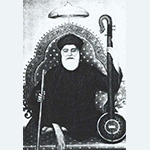
Sachal Sarmast (1739-1829), a Sufi Sindhi poet, was born in Daraza, near Ranipur, Sindh. His real name was Abdul Wahab Farouqi. Very early, Sachal lost his father and was brought up by his uncle Pir Khawaja Abdul Haq I, who later became his spiritual guru. He was nicknamed ‘Sachu’, meaning truthful, or ‘Sachal’, meaning ecstatic, and became known as the ‘truthful mystic’ or ‘ecstatic saint of truth. Sachal was an ardent follower of wahdat-ul-wujood (‘unity of existence’), an Islamic philosophy. He wrote poetry in seven languages which include Sindhi, Saraiki, Punjabi, Farsi and Urdu during the Kalhoro era of Sindh. His devotees called him shair-e-zaban which means ‘poet of seven languages’. His compositions are in the form of kaafi, vai, kalaams and ghazals. The poetry of Sachal Sarmast is as lyrical as it is spiritual as he uses Sindhi folktales like Heer Ranjha, and Sasui and Punhoon to juxtapose the feelings of the seeker who is pursuing the Divine. The most popular available edition of Sachal Sarmast’s poetry today is a compilation of select poems entitled Sachal Jo Chund Kalaam, edited by Kalyan B Advani and published by Sahitya Akademi (1963). It is based on the comprehensive works Risaalo Sachal Sarmast: Sindhi Kalaam and Risaalo Sachal Sarmast: Saraiki Kalaam by Usman Ali Ansari (1958) and Muhammad Sadiq Ranipur (1959).
The translations are being published by Om Books International in a forthcoming volume.